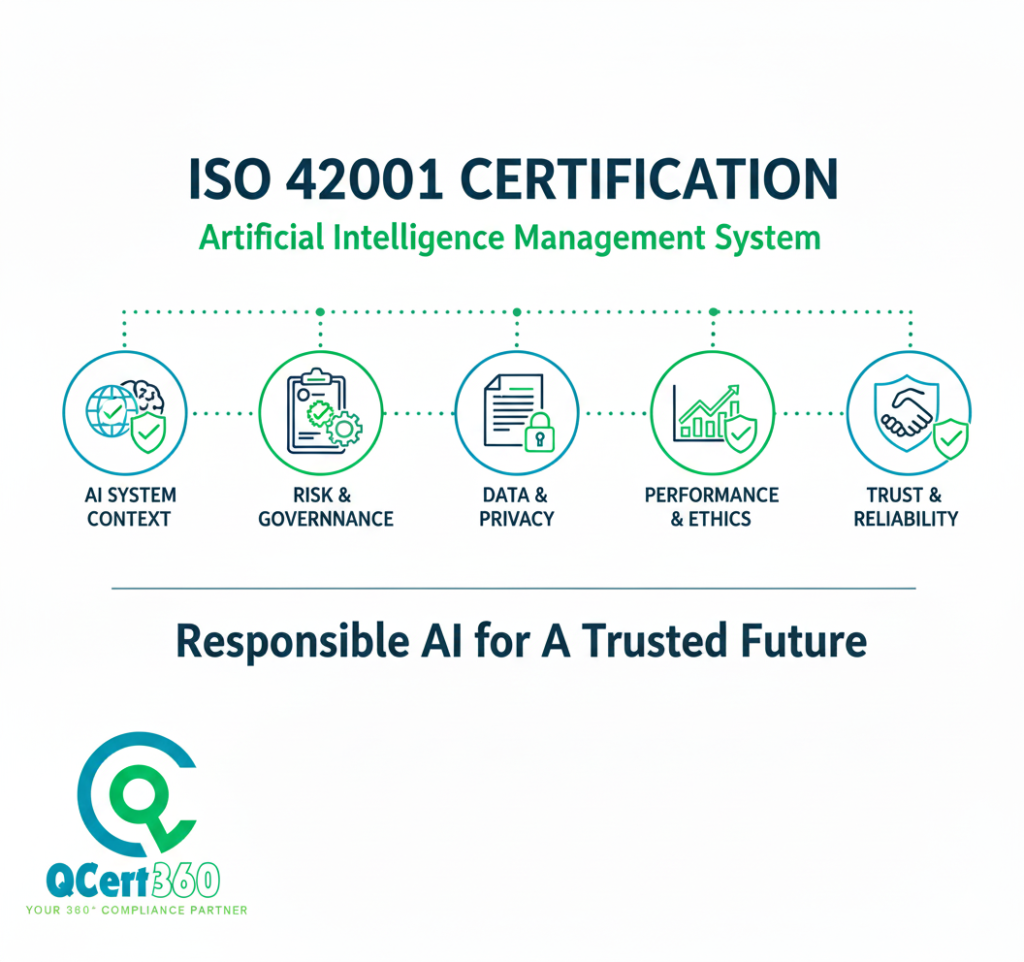ISO 42001:2023 Certification
ISO/IEC 42001:2023 is the first international standard for Artificial Intelligence Management Systems (AIMS). It provides a structured framework to help organizations develop, deploy, and manage AI systems responsibly, ensuring ethical practices, transparency, and compliance with global regulations. The standard emphasizes leadership commitment, risk and impact assessments, lifecycle management, and third-party oversight. It aligns with emerging regulations like the EU AI Act and supports integration with existing governance frameworks such as ISO 27001. ISO/IEC 42001:2023 is applicable to any organization involved in AI, regardless of size or sector. Certification demonstrates a commitment to responsible AI, enhancing stakeholder trust and facilitating compliance in an increasingly regulated environment
Request a Call Back
Get Free Consultation
Have any Questions?
Mail us Today!
contact@qcert360.com
ISO 42001:2023 Certification – Managing AI Systems Responsibly and Effectively
Artificial Intelligence (AI) is transforming industries, from healthcare and finance to education and public services. But with great power comes great responsibility. Organizations deploying AI systems face ethical, operational, and regulatory challenges. ISO/IEC 42001:2023 certification provides a globally recognized framework for establishing, implementing, and continually improving an AI Management System (AIMS), ensuring that AI is used responsibly, transparently, and effectively.
What is ISO 42001:2023 certification?
ISO 42001:2023 is the first international standard designed specifically for AI management systems. It outlines requirements for organizations to develop and operate AI responsibly, with an emphasis on governance, ethical considerations, risk management, and continuous improvement.
The standard applies to organizations of any size or sector involved in AI—whether developing AI products, integrating AI into operations, or providing AI-based services. By implementing ISO/IEC 42001:2023, organizations can demonstrate accountability, reduce risks, and build trust among stakeholders, clients, and regulators.
Why ISO 42001:2023 certification Matters
AI offers tremendous opportunities, but it also introduces challenges such as bias, limited transparency, and potential regulatory non-compliance. ISO 42001:2023 provides a structured framework for organizations to address these challenges effectively:
Ethical AI practices – Encourages fairness, transparency, and accountability throughout AI system design, development, and deployment.
Risk mitigation – Helps identify, assess, and manage operational, reputational, and legal risks associated with AI technologies.
Regulatory alignment – Ensures AI systems adhere to emerging international regulations, standards, and best practices.
Operational efficiency – Optimizes AI development and deployment processes for more consistent, effective outcomes.
Stakeholder trust – Builds confidence among clients, partners, and regulators by demonstrating responsible and ethical AI use.
This approach enables organizations to leverage AI confidently while minimizing risks and enhancing credibility.

Benefits:
Enhanced Marketability:
Obtaining certification boosts brand visibility and credibility, making products and services more attractive to consumers and increasing market share in global markets.
Consumer Trust & Satisfaction:
Certification assure customers of consistent quality, safety, and reliability, fostering trust, increasing brand loyalty, and ensuring higher levels of customer satisfaction.
Regulatory Compliance
Certification ensure compliance with global standards and regulations, helping businesses avoid legal issues, penalties, and enabling smoother entry into diverse international markets.
Competitive Advantage
Holding certification distinguishes a business from competitors, signaling superior quality and reliability, and positioning the company as an industry leader in the market.
Global Expansion
Certification provide access to new international markets, demonstrating that a business meets global standards, which facilitates expansion and opens doors to new business opportunities worldwide.
Risk Mitigation & Efficiency
Certifications help identify and mitigate risks, streamline operations, and reduce errors or defects, ensuring efficiency and consistency while safeguarding against operational disruptions.
Core Components of ISO 42001:2023 certification
ISO 42001:2023 adopts a structured approach that promotes continuous improvement in AI management, ensuring systems remain responsible and effective:
Governance Structure – Clearly defines roles, responsibilities, and accountability for overseeing AI initiatives across the organization.
Risk Management – Identifies potential risks related to AI operations and implements strategies to mitigate them proactively.
Transparency and Accountability – Ensures AI decisions are explainable, traceable, and that outcomes can be audited effectively.
Ethical Considerations – Addresses critical issues such as bias, fairness, privacy, and the broader societal impact of AI deployment.
Continuous Improvement – Encourages ongoing evaluation and refinement of AI practices to adapt to evolving technology and business needs.
By integrating these components, organizations establish a strong and adaptable framework for responsible AI, capable of evolving alongside technological advancements and organizational goals.
Benefits of ISO 42001:2023 Certification
Organizations that achieve ISO 42001:2023 certification gain multiple advantages that go beyond compliance:
Enhanced trust – Demonstrates a clear commitment to ethical and responsible AI practices, strengthening relationships with clients, partners, and regulators.
Risk reduction – Proactively identifies and addresses potential operational, reputational, and legal risks associated with AI systems.
Regulatory compliance – Aligns AI operations with international laws, emerging regulations, and industry best practices.
Operational efficiency – Streamlines AI development, deployment, and management processes for more consistent and reliable outcomes.
Market differentiation – Positions the organization as a leader in responsible AI, creating a competitive advantage in the marketplace.
By achieving certification, organizations not only manage AI responsibly but also enhance credibility, efficiency, and long-term sustainability.
Who Needs ISO 42001:2023 Certification?
ISO 42001:2023 is applicable to any organization that develops, deploys, or utilizes AI systems, ensuring responsible and ethical practices. This includes:
Technology companies – Designing and delivering AI-driven products, software solutions, or platforms that impact users and business operations.
Healthcare providers – Applying AI in diagnostics, patient care, treatment planning, and operational workflows to enhance outcomes safely.
Financial institutions – Leveraging AI for decision-making, risk analysis, fraud detection, and automated financial processes.
Government agencies – Using AI for public services, policy implementation, infrastructure management, and citizen-focused applications.
Educational institutions – Integrating AI into research, administrative systems, and learning tools while ensuring ethical use.
In short, any organization aiming to deploy AI responsibly, manage associated risks, and strengthen stakeholder confidence can greatly benefit from ISO/IEC 42001:2023 certification.
Continuous Improvement Under ISO 42001:2023 certification
ISO 42001 promotes a culture of ongoing improvement in AI management. Through regular audits, continuous monitoring, and periodic reviews of AI systems, organizations can adapt proactively to evolving technologies, emerging ethical considerations, and changing regulatory requirements. This continuous improvement approach ensures that the AI Management System (AIMS) remains effective, transparent, and accountable, while AI deployments consistently align with best practices and stakeholder expectations over time.
Conclusion: Qcert360 Expertise in provding ISO 4200 certification serviceproviding
ISO 42001:2023 certification is not just a compliance requirement—it’s a strategic approach to responsible AI management. Implementing a robust AI Management System (AIMS) helps organizations manage risks, maintain stakeholder trust, and enhance operational performance.
Qcert360 provides expert guidance through the entire ISO/IEC 42001:2023 journey. From initial gap analysis and AI risk assessment to system implementation, training, and audit readiness, Qcert360 ensures your organization meets all standard requirements efficiently. Partnering with Qcert360 means more than achieving certification—you gain a trusted, ethical, and future-ready AI governance framework.
Sectors & Industries we serve
Our Services
ISO Standards
- ISO 9001 Certification
- ISO 14001 Certification
- ISO 45001 Certification
- ISO 22000 Certification
- ISO 17025 Certification
- ISO 27001 Certification
- ISO 13485 Certification
- ISO 20000-1 Certification
- ISO 41001 Certification
- ISO 22716 Certification
- ISO 50001 Certification
- ISO 22301 Certification
- ISO 29993 Certification
Product Certifications
Other international standards
- FSSC 22000 Certification
- HIPAA
- HACCP Certification
- SA 8000 Certification
- GMP Certification
- GDPR
- GDP Certification
- GLP Certification
- Certificate of Conformity


